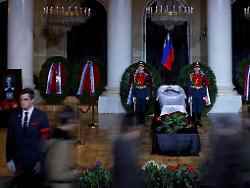Thousands at Gorbachev’s coffin
“The only legal way to express your opinion”
9/3/2022 5:49 p.m
Hardly any politicians and companions travel to Mikhail Gorbachev’s funeral, both from Russia and from abroad. Thousands of Russian citizens, however, sometimes queue for hours to bid farewell to the last Soviet head of state. This also has to do with the current political situation.
Mozart’s Requiem plays quietly. The light in the pillared hall of the Moscow Trade Union House is dimmed. The coffin is open. Time to say goodbye to a great politician who is still held in high esteem in Germany for his services to reunification: Mikhail Gorbachev. There are thousands who spend hours paying their last respects to the Nobel Peace Prize winner. But the big celebrities are missing: Kremlin boss Vladimir Putin is missing – allegedly because of an important business trip. Not a single top politician from the West is there because Russia is at war with Ukraine.
Just a thought: What would Gorbachev’s farewell have looked like in peacetime? Who would not have let it be taken to pay him their last respects. Now, to the left of the entrance, a huge black-and-white portrait of the man with the distinctive birthmark on his forehead looks down at visitors. Their path then leads to the right towards a balustrade overloaded with flowers, behind which stands the coffin with the waxen corpse. In front of the building near the Kremlin, the queue is still long.
There is hardly any time to pause and reflect during the public funeral service: a brief moment to lay flowers, a small bow. The stewards are already waving impatiently. “Don’t stop,” they whisper. “I still had to cry when I walked by,” says Sifa. “An era came to an end with Gorbachev and we don’t know how things will continue now.” The last president of the long-gone Soviet Union died in a Moscow hospital on Tuesday at the age of 91. The pensioner queued for more than two hours. She owes a lot to Gorbachev, says the Muscovite. He woke up Russia, opened the country to the world – and the world to its own citizens. “He was also the first head of state I felt was a man.” Gorbachev had a wife and family – and openly showed his love for them.
Scholz cancels, Macron can be represented
It should be a modest funeral, says Gorbachev’s daughter Irina. There is no state funeral. Putin is not standing at the coffin and is not giving a funeral speech – unlike in 2007, when President Boris Yeltsin died. His body was laid out in Russia’s most important church, the Cathedral of Christ the Savior. All these honors do not exist for Gorbachev. During the funeral service, the Kremlin released a statement that Putin had spoken to Turkish President Recep Tayyip Erdogan on the phone. It is not the Kremlin chief who praises Gorbachev, but Erdogan.
Unlike with Yeltsin, there are hardly any prominent international politicians standing at the open coffin. The only EU head of government to travel from Hungary is Viktor Orban. Chancellor Olaf Scholz canceled and French President Emmanuel Macron was represented by his ambassador to Russia. Perhaps US President Joe Biden would have flown across the Atlantic. However, Moscow has imposed an entry ban on him, as it has on other Western politicians. Because of the Russian war of aggression against Ukraine, there is an ice age between Russia and the West.
It was Gorbachev who, with his policy of glasnost (openness) and perestroika (restructuring), created the conditions for the end of decades of confrontation and also for the fall of the Berlin Wall in 1989. To this day, his name stands for historic nuclear disarmament that he initiated with the United States at the time.
“A Real Human”
Love was the motive for many of his actions, says Olga, a 60-year-old Muscovite waiting in line. “He made German unity possible because he understood what it means when the family is separated.” Surely he could have asked for a higher price for it. But he was just a romantic. “But he was never a self-promoter like the current politicians, but a real person.”
The then head of the Kremlin, who had to be hospitalized repeatedly in recent years, wanted to use his reforms to modernize communism. But he himself initiated the collapse of the superpower Soviet Union, the end of the communist power empire. To this day, many people resent him for that at home. That was echoed in Russian post-mortem reactions.
After all, the state television keeps showing the funeral service and shows documentaries about “Gorbi”, as he is called in Germany. Many of the thousands of people standing in front of the union building have seen him as a politician themselves. But there are also some younger people in line. “One of my daughter’s classmates is also there,” says Anton Orech, a former columnist for the liberal radio station Echo of Moscow. It is probably not only the admiration for the reformer Gorbachev, but also the current political situation. “Under the current conditions, it’s the only legal means of expressing one’s opinion.”
